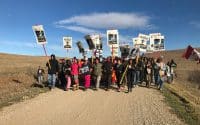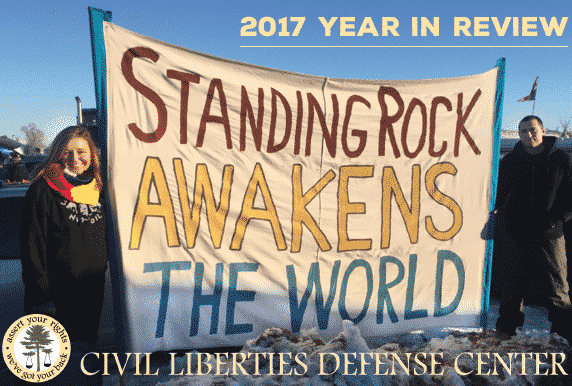In troubled political times like these, Civil Liberties Defense Center is called upon to provide expert legal support to a wide variety of social and environmental movements with unprecedented frequency. We are proud and honored to have defended over 150 climate defenders nationwide this year, including those in Skagit County, Washington and spanning all the way to Huntingdon, Pennsylvania. We have offered more than 80 Know Your Rights, digital security, and other trainings to over five thousand participants. We also trained and provided legal observers for dozens of rallies, protests, and direct actions across the country, including those at Standing Rock in North Dakota. Since we worked so hard on so many fronts this year, we decided to publish an end-of-year recap of some of our major projects and accomplishments. We hope you enjoy it!
You can download our 2017 Year in Review as a PDF here: 2017 Annual Report or continue reading below.
Defending Water Protectors at Standing Rock
 In September, 2016 we started working with the legal collective at Oceti Sakowin, the large encampment at Standing Rock, to provide trainings, set up systems to provide legal support, and offer legal representation to water protectors in North Dakota. Even though the occupation on the ground has ended, we continue to represent water protectors in the criminal courts, defend people who are contacted or receive grand jury subpoenas from the FBI, and seek justice in the federal courts for those whose constitutional and treaty rights have been violated by the State (including police and jails). Our litigation work in North Dakota will continue for at least two more years. Once the headlines subside and the activists move on to the next battle, CLDC lawyers continue the legal fight—which is often a lonely, hard road. Your support for our continued work at Oceti Sakowin is even more important now.
In September, 2016 we started working with the legal collective at Oceti Sakowin, the large encampment at Standing Rock, to provide trainings, set up systems to provide legal support, and offer legal representation to water protectors in North Dakota. Even though the occupation on the ground has ended, we continue to represent water protectors in the criminal courts, defend people who are contacted or receive grand jury subpoenas from the FBI, and seek justice in the federal courts for those whose constitutional and treaty rights have been violated by the State (including police and jails). Our litigation work in North Dakota will continue for at least two more years. Once the headlines subside and the activists move on to the next battle, CLDC lawyers continue the legal fight—which is often a lonely, hard road. Your support for our continued work at Oceti Sakowin is even more important now.
Right now we are representing 14 indigenous water protectors from Standing Rock with pending criminal cases. The next round of trials for these cases are scheduled in June 2018. These fourteen cases are in addition to our work resulting in dismissals for dozens of other water protectors, who faced similar criminal charges.
We are one of the lead attorneys on the Standing Rock class action civil rights case, Dundon, et. al. v. Kirchmeier, et. al, which challenges a plethora of North Dakota law enforcement officials for their use of water cannons, rubber bullets, CS gas and other munitions against non-violent water protectors in subfreezing temperatures on November 20, 2016. We are currently waiting on an 8th circuit appellate decision on the Court’s denial of our preliminary injunction. Once that decision is back, we will then continue litigating in the North Dakota Federal District Court. This case will not be resolved for at least another year, and could span five years to resolve.
Our work at Standing Rock also included leading a legal team that assisted indigenous activists who were subpoenaed to appear before federal grand juries but resisted. Each of them had their subpoenas dismissed and did not have testify or go to jail. We also continue to advise several key organizers and entities who continue to endure FBI harassment and surveillance.
CLDC attorneys continue to offer free legal advice, second opinions, and consultation to water protectors and other lawyers concerning defending activists in hostile territories like Morton County, North Dakota.
Representing Sophia Wilansky
CLDC is representing Sophia Wilansky, both in criminal and civil court cases. Sophia is the young activist who almost lost her arm while at Oceti Sakowin when police launched a concussion grenade directly at her, from a short distance. Immediately, the State concocted a false narrative attempting to blame her, accusing her of blowing herself up in an to attempt to insulate themselves from responsibility for her grave injuries. Even more appalling, the State and FBI immediately showed up in her hospital room and threatened her family and doctors, as well as threatening criminal charges against her as she fought for her life. CLDC and the Williams Connelly law firm in Washington, DC are in the early stages of bringing a federal civil rights action on Sophia’s behalf. We also continue to defend her and her family against the unethical attempts to criminally investigate Sophia for the abuse she sustained at the hands of law enforcement.
Fighting for the Necessity Defense in the Valve Turners Trials
 CLDC provides legal support and representation to all of the Valve Turners who engaged in direct action to protect the climate from the fossil fuel industry. Last October, climate defenders shut off valves on the four pipelines that carry tar sands oil from Alberta, Canada into the United States. Their action blocked 15 percent of U.S. crude oil imports for nearly an entire day.
CLDC provides legal support and representation to all of the Valve Turners who engaged in direct action to protect the climate from the fossil fuel industry. Last October, climate defenders shut off valves on the four pipelines that carry tar sands oil from Alberta, Canada into the United States. Their action blocked 15 percent of U.S. crude oil imports for nearly an entire day.
The activists took these actions with the intention of bringing forth a climate necessity defense in the various state courts of Washington, Montana, Minnesota and North Dakota. The legal teams drafted extensive legal briefing on the necessity defense, and lined up dozens of expert witnesses including scientists, policy experts, movement experts and engineers. These professionals were ready to inform the jury exactly why the Valve Turner actions were justified (or necessary) in the face of imminent climate catastrophe – exacerbated by carbon emissions from tar sands oil extraction and government inaction on climate policy.
In the Washington case, we obtained a partial victory. The Court denied our request to argue the necessity defense to the jury, but the trial ended with a hung jury—even without being able to articulate the defense, the jury would not convict Ken Ward of felony sabotage and burglary. The State refiled the case, the judge again denied us the defense, and this time the jury again refused to convict on the sabotage charge. Unfortunately it did find him guilty of the burglary charge. Despite facing ten years in prison, the Skagit County judge sentenced Ken to 240 hours of community service—no fines, no jail, no probation, and no restitution to Kinder Morgan Pipeline Corporation. In November of this year, we filed an appeal of the court’s decision to deny the necessity defense, to try and create strong case precedent that may permit climate activists to use the necessity defense in the future. If this appeal is successful, it will help establish a legal defense that will recognize the severity of the climate crisis and the greed of big corporations who profit from the destruction of the planet and the suffering of its inhabitants, as well as the unwillingness of the government to protect the people from egregious profiteering.
In October, we were in Pembina County, North Dakota representing Michael Foster and Sam Jessup of the valve turners. They too were denied the necessity defense and were convicted of lesser charges; sentencing will take place in January. This past month we were in Chouteau County, Montana representing Leonard Higgins who was denied the necessity defense and was convicted. Finally, we will be in Minnesota for two more valve turner activists in the coming months.
SLAPPing Back against Corporate Bullies 
CLDC has led the way in helping activists and organizations resist the chilling effect of Strategic Lawsuits Against Public Participation (SLAPP). We’ve done this by researching and writing arguments for court proceedings, training activists on how to best avoid SLAPP suits, and assisting in the defense of SLAPP suits in state and federal courts. We undertake all of this work without requiring our clients to pay attorney fees to defend them against attempts at censorship of their political activity.
Cases like the one recently filed by Energy Transfer Partners (ETP), the unethical corporation responsible for aggressive construction of the Dakota Access Pipeline (DAPL) and fueling police confrontation of protesters at Standing Rock, was akin to a frustrated bully lashing out at one or two folks in a crowd calling them out for their misconduct. There is no way that ETP and its henchmen at the Kasowitz Law Firm (Trump’s personal lawyer) could sue everyone who organized against their climate misdeeds. So instead they filed against Greenpeace, one of the largest environmental organizations in the world, BankTrack, a small Dutch group that organizes on issues related to the corporate financing of projects that exacerbate global climate change. They also named “Earth First,” which is not an organization and did not have a presence at Standing Rock, and a mysterious clump of 20 unnamed people (John and Jane Doe’s).
The point of these SLAPP suits is to use the courts and media to try and deter people from organizing against pipelines and the corporations responsible for them. Their hope is by filing a high-profile case against climate activists, it will make a big splash and will scare people into submission — and stop them from organizing protests and campaigns to block companies like ETP from future climate-killing pipelines and other fossil fuels developments.
If you or your organization finds yourself confronted with a SLAPP suit, contact CLDC right away! We recommend that you redouble your efforts, organize even more strategic resistance, and help grow the movement that may be the sole line of defense remaining for the planet and its inhabitants. To do anything less gives ETP and their firm of soulless lawyers a victory, without even obtaining a court ruling. As for CLDC, we’ll continue to support the named defendants in this case and any future SLAPP suit against climate defenders, by providing free legal resources and support.
Break Free from Fossil Fuels
 In May of 2016, hundreds of climate activists organized an action in Anacortes, Washington to stop oil trains heading to the Tesoro Oil Refinery. The refinery is the largest source of carbon pollution in the Pacific Northwest, and activists shut down all oil trains heading towards the refinery for more than two days. At the time, it was the longest train blockade in history.
In May of 2016, hundreds of climate activists organized an action in Anacortes, Washington to stop oil trains heading to the Tesoro Oil Refinery. The refinery is the largest source of carbon pollution in the Pacific Northwest, and activists shut down all oil trains heading towards the refinery for more than two days. At the time, it was the longest train blockade in history.
On that day in May 2016, 52 activists were arrested, and CLDC has provided legal support and representation since. The cases are ongoing, with the final trial scheduled for January 2018.
Community Organizing
In the past year, CLDC has expanded our community organizing and outreach through a wide variety of trainings and legal observation at public events. We were able to succeed in this after hiring our first organizer, Erin Grady, to assist our legal teams in deepening our connections and effectiveness in serving our community as a whole. This year we provided free trainings to activist groups all over the bioregion that included Know Your Rights, Grand Juries, SLAPP suits and RICO cases, and Digital Security for Activists. With state repression of dissent on the rise, we will continue to provide these trainings and encourage activists to learn better safety habits so they may protest smarter, and protect themselves and their friends.
Our organizing this year included CLDC’s coordination of the fourth annual Next Generation Climate Justice Action Camp for young climate activists. This year’s racially diverse camp attracted almost fifty youth, consisting of young leaders from the Yurok, Karuk, and Hoopa Tribes, and a wide range of other cultural backgrounds — and from as far away as Louisiana. From the woods of Southern Oregon, the Next Generation camp offered effective trainings and breakout groups that confronted racism, gender and LBGTQIA injustices. Our curriculum included campaign strategy, non-violent direct action planning, a youth-specific Know Your Rights training, and hands on media training. Throughout the week, while they were learning these new skills, the youth also planned a dynamic protest together, and coordinated a powerful and strategic action against the proposed Jordan Cove Liquefied Natural Gas (LNG) project and Pacific Connector Pipeline. The protest resulted in nearly 100 people rallying, with spoken word and speeches, and displaying creative visuals as they marched in the streets of Medford to the offices of Senators Ron Wyden and Jeff Merkley. The youth-led media team also earned favorable coverage in every local media outlet. With radical diversity, comes deep challenges. We are thoughtfully progressing on this project, while learning about the power of youth and how to respectfully work across cultures for climate justice.
This past year we also worked hard to support the immigrant rights movement both in Lane County and across the State of Oregon. We developed a strategy for broadening our reach with Spanish and English Language Know Your Rights for the Immigrant Community Trainings by facilitating a train-the-trainer series. The series increased our base of Spanish speaking trainers who have responded to the need expressed by our local Latino community to provide more trainings more frequently while residents face increasing scrutiny under the Trump administration. In addition, we are exploring ways that our legal observer role can be modified and used for rapid response to ICE encounters.
Finally, we have developed specialized trainings and legal support for anti-racist and anti-fascist organizers and activists. CLDC is deeply committed to supporting the critical role these people play in the fight against hate, bigotry and intolerance.
Digital Security
CLDC is committed to educating our activist communities on the tools that can be used with confidence by dissident organizers to resist surveillance and remain free to take action. Activist groups today are equipped with widespread and affordable digital cameras, satellite navigation, and instantaneous global communications and social networking. These technologies provide significant organizing advantages. At the same time, State and corporate opponents will turn these complex tools against activists, enabling systematic surveillance and sophisticated infiltration and disruption. In a world where millions of digital communications are silently intercepted, collected, and stored every day, how do activists effectively say “I do not consent to this search?” As in a physical encounter with law enforcement, we must be proactive. Online, this means using encryption along with other privacy-protecting and autonomy-preserving tools.
Our choice of tools is of vital importance—corporate digital infrastructure that may be convenient to use can be relied upon to snitch on anyone accused of making trouble for racist, neocolonial and patriarchal government agencies and exploitative or toxic industries. Community-driven, trustworthy, and proven digital security tools exist, but can require a sometimes steep learning curve. Also, all technologies have certain limitations. Knowing exactly what these are is crucial to using them safely and effectively. Finally, technology changes faster than the law. New backdoors and security flaws are discovered by researchers—or leaked to journalists by inside dissenters—every week.
Support our work
Please consider supporting CLDC today. Because we constantly fight back, using every sound legal tool available to confront corporate greed and stop government repression in our movement, we rely heavily on support from individual grassroots supporters through donations. We never take grants from the federal government or large corporations. CLDC is powered by thousands of individual people like you from across the country who commit to our work. To put it simply, we are only able accomplish what you see in this Year in Review with grassroots support. Will you commit to our work defending frontline activists and supporting people’s rights by becoming a sustaining member, or making a one-time donation before the year’s end?

